With eco-friendly green management policy to reduce greenhouse gas emissions and environmental pollution, we respond to global climate change for the development of sustainable society.
Social Good Partner

-
Environmental Management Policy
Hyundai Corporation is committed to building a sustainable future as a trusted Social Good Partner. As climate change and environmental issues pose growing global challenges, we recognize our responsibility to take meaningful action. In alignment with international efforts, we are strengthening our commitment to environmental stewardship through the following actions:
1. Empowering Our People
We provide regular training and education to equip employees with the knowledge and tools to integrate sustainability into their daily work.
2. Driving Operational Efficiency
We pursue initiatives to conserve resources and reduce energy consumption across all aspects of our operations.
3. Investing in Green Innovation
We actively invest in sustainable technologies and develop environmentally responsible businesses to reduce our environmental footprint.
4. Upholding Global Standards
We comply fully with applicable environmental laws and regulations worldwide, honoring our duty to protect the planet. -
Environmental Goals and Strategy
In line with our environmental management policy, Hyundai Corporation sets clear objectives and implements targeted strategies to drive continuous progress.
Each year, we establish measurable goals, including reducing energy consumption and expanding our portfolio of environmentally responsible businesses. Looking ahead, we are advancing long-term initiatives such as our commitment to RE100 and increasing investments in sustainable solutions. Our RE100 roadmap is led by Hyundai Renewable Lab, primarily through solar energy projects. In addition, we are actively identifying and investing in emerging opportunities across high-impact sectors—including electric mobility, renewable energy, and waste management—which are gaining global momentum and aligning with our vision for a low-carbon futureCategory Short-Term Target
(2025)Mid to Long-Term Target
(by 2030)Detailed Action Plans Energy Consumption Reduction Electricity Use Reduction Under 142,559 kwh Under 132,773 kwh
(10% reduction compared to 2023)– Lights-off campaigns outside working hours
– Stair use campaignsWater Use Reduction Under 222 tonns Under 180 tons
(10% reduction comparred to 2023)– Water-saving campaigns RE100 Join RE60 Join RE100 – Secure a contract among KEPCO, Hyundai Corporation, and Yonhap News to source 60% of electricity needs from Hyundai Renewable Lab solar power Expansion of Eco-Friendly Business Increase Green Revenue* KRW 2.5 billion KRW 3.0 billion (25% growth compared to 2023)
– Expand solar power projects
– Develop new eco-friendly product transactionsIncrease Investment in Solar Power Projects Increase Investment in Solar Power Projects
KRW 2.8 billionCumulative investment of KRW 25 billion
(KRW 19 billion invested as of 2024)– Expand investments in domestic and overseas solar power plants Expand New Eco-Friendly Investments Achieve 1% share of total revenue Grow to over 5% share of total revenue – Continue exploring investments in renewable energy and eco-friendly mobility * Eco-friendly business revenue: KRW 2.5 billion (2022), KRW 2.4 billion (2023), KRW 1.8 billion (2024)
-
Eco-Friendly Green Management Activities
To advance our commitment to eco-friendly green management, Hyundai Corporation has established a dedicated implementation structure, led by the Planning Team in collaboration with Corporate Functions and Business Divisions. Together, we are driving mid- to long-term initiatives aimed at addressing global climate change and minimizing environmental impact across our headquarters and global operations.
Key initiatives include:
• RE100: Transitioning to 100% renewable electricity across all operations
• Solar Energy Projects: Ongoing investment in and monitoring of solar power plants
• Digital Transformation: Implementing digital workflows to reduce paper usage
• Resource Efficiency: Reusing single-sided paper and promoting double-sided printing
• Energy-Saving Campaigns: Encouraging lights-off and PC shutdown during breaks
• Sustainable Mobility: Promoting stair use through wellness programs to reduce elevator use
• Employee Engagement: Delivering training programs to enhance environmental awareness
Since the launch of our ESG framework in 2020, we have maintained a record of zero environmental violations or related incidents. We continue to deliver measurable outcomes, including reductions in energy consumption and growth in revenue from sustainable businesses.
- Environmental Management Organizational Structure
- CEO
- Head of Corpate
Functions Division - Corporate Planning Team
- PV Recycle Team Resource Circuation Unit
- Corprate Suppory Team HR Development Team
-
-
Energy Conservation Initiatives
Hyundai Corporation is committed to building a sustainable future by reducing energy consumption across its operations. At our headquarters in the Yonhap News Building, eco-friendly solar panels have been installed along window facades to help meet part of the building’s electricity needs. Additionally, all restrooms are equipped with sensor-activated faucets to reduce both water and energy usage, supporting more sustainable facility operations.
• Key energy-saving activities include:
– Lights-off campaigns during non-working hours (after office hours and lunch breaks)
– Water conservation campaigns across office areas
As a result of these initiatives, per capita water and electricity consumption has steadily declined since 2021, demonstrating our commitment to operational efficiency and environmental responsibility.
[Energy Consumption ]
Category Unit 2021 2022 2023 2024 Actual Actual Actual Actual Target Water Total Consumption TON 229 201 201 222 201 Per Capita Consumption TON per capita 1.08 0.87 0.87 0.88 0.87 Electricity Total Consumption KWh 146,489 145,526 147,526 142,599 147,526 Per Capita Consumption KWh per capita 688 636 636 566 636 Energy Intensity MWh/KRW 100M in sales 0.0051 0.0030 0.0030 0.0029 0.0030 • Resource Circulation (Waste Reduction) Initiatives:
Hyundai Corporation’s domestic operations are based in a single location, the Yonhap News Building. Apart from general office waste, no other types of industrial waste are generated.
To reduce waste, we have introduced:– Company-wide paperless meetings using digital conferencing tools and Power BI solutions, continuously lowering toner consumption
– Virtual desktop infrastructure (VDI) to minimize IT-related waste
– Double-sided printing to cut paper use
These efforts led to a 15% reduction in printing paper consumption in 2024 compared to 2023.
• Greenhouse Gas Emissions:
In 2023–2024, annual greenhouse gas emissions totaled 35.3 tCO2 (calculated based on occupied floorspace), achieving our internal target of 50.0 tCO2. The emissions intensity, calculated based on headquarters standalone revenue, was 0.001 tCO2 per KRW 100 million in sales.
* Note: All figures related to energy, water, waste, and greenhouse gas emissions are based on the headquarters site only.
-
Environmental Management Compliance
Hyundai Corporation recognizes regulations stemming from changes in domestic and international environmental policies and laws as potential risks and takes proactive measures to minimize their impact.
When evaluating new business investments, we assess and consider the potential environmental impacts of each project. In particular, at PT Hyundai Inti Development, our industrial complex in Indonesia, we are taking proactive steps to strengthen the environmental capabilities of partner companies and minimize emissions of pollutants.
HID (Indonesia Complex) Environmental Management Compliance
Category Potential Risks Proactive Mitigation Strategies Financial Risks Risk of fines due to violations of wastewater treatment regulations Conduct regular site inspections of tenant companies and ongoing monitoring; communicate findings and request improvements where necessary Increased costs due to stricter wastewater treatment standards Continuously monitor local wastewater standards and invest in treatment facility improvements Non-Financial Risks Reputational damage from media coverage of regulatory violations Establish a focused management system, including monthly water quality inspections by external laboratories to enhance monitoring and compliance -
Environmental Training Overview
Hyundai Corporation provides ongoing training to raise employees’ awareness of environmental issues, expand eco-friendly business opportunities, and strengthen ESG practices. Key training topics by year are as follows:
- (2021)
• The Future of the Hydrogen Economy and Opportunities
• Bio-Refinery Technologies and Industries as Sustainable Growth Drivers
• Understanding Green Ammonia Energy - (2022)
• Trends in the Eco-Friendly Mobility Industry and ESG Strategies - (2023)
• Domestic and Global Waste Industry Trends and Strategies
• Plastic Waste Recycling Business - (2024)
• Understanding the Domestic Waste Recycling Business
• Eco-Friendly Business Training: Solar Panel Waste Recycling
* Details of 2024 Training Programs
Training Program Date Participants Number of Trainees Notes Understanding Domestic and Global Waste Recycling Business해 January 2024 All Executives, Team Leaders, Overseas Assignees 127 Company-wide Special Lecture Eco-Friendly Business Training – Solar Panel Waste Recycling May 2024 Program participants 12 Leadership Development Program November 2024 G/S Program Participants 20 Global Staff Development Program정 - (2021)
-
Renewable Energy Investment Activities
Since establishing Hyundai Renewable Lab Co., Ltd. in 2017, Hyundai Corporation has been committed to developing sustainable business models and making continued investments in domestic and international renewable energy projects, primarily in solar power. From 2017 to 2022, Hyundai Corporation’s annual investment amounted to KRW 1.4 billion in 2017, KRW 2 billion in 2018 (planned: KRW 5 billion), KRW 8.4 billion in 2019 (planned: KRW 20.1 billion), KRW 1.1 billion in 2020 (planned: KRW 4.8 billion), KRW 3.4 billion in 2021 (planned: KRW 3.1 billion), and KRW 2.8 billion in 2022 (planned: KRW 2.8 billion).
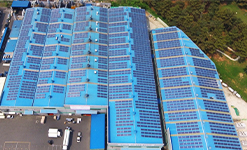 • No. 1 in Korea, 686 kW, roof-type (Wanju, Jeonbuk)
• No. 1 in Korea, 686 kW, roof-type (Wanju, Jeonbuk)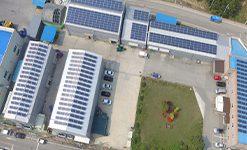 • No. 1 in Korea, 185 kW, roof-type (Nonsan, Chungnam)
• No. 1 in Korea, 185 kW, roof-type (Nonsan, Chungnam)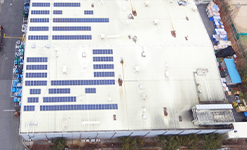 • No. 3 in Korea, 96 kW, roof-type (Wanju, Jeonbuk)
• No. 3 in Korea, 96 kW, roof-type (Wanju, Jeonbuk)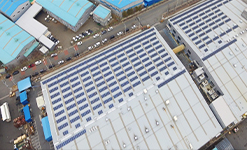 • No. 4 in Korea, 398 kW, roof-type (Wanju, Jeonbuk)
• No. 4 in Korea, 398 kW, roof-type (Wanju, Jeonbuk)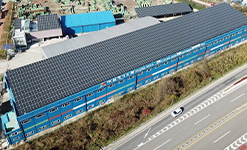 • No. 5 in Korea, 674 kW, roof-type (Wanju, Jeonbuk)
• No. 5 in Korea, 674 kW, roof-type (Wanju, Jeonbuk)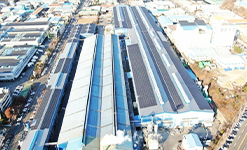 • No. 6 in Korea, 2,897 kW, roof-type (Gyeongsan, Gyeonhbuk)
• No. 6 in Korea, 2,897 kW, roof-type (Gyeongsan, Gyeonhbuk)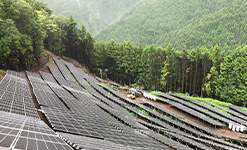 • No. 1 in Japan, 1,166 kW, field (Kuromate)
• No. 1 in Japan, 1,166 kW, field (Kuromate)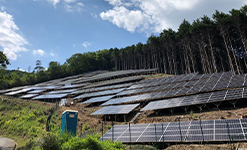 • No. 2 in Japan, 578 kW, field (Mimasaka)
• No. 2 in Japan, 578 kW, field (Mimasaka)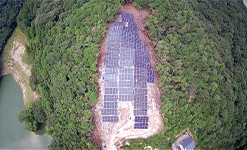 • No. 3 in Japan, 500 kW, field (Yumesaki)
• No. 3 in Japan, 500 kW, field (Yumesaki)
-
Employee-Led Eco-Friendly Activities
Hyundai Corporation employees actively participate in eco-friendly initiatives, including plogging and implementing waste sorting in the workplace. Moving forward, we will continue to plan and carry out diverse environmental activities to help improve local communities and contribute to a more sustainable future.
 • (September 28, 2023) Singapore Branch – Marine Environment Protection Plogging
• (September 28, 2023) Singapore Branch – Marine Environment Protection Plogging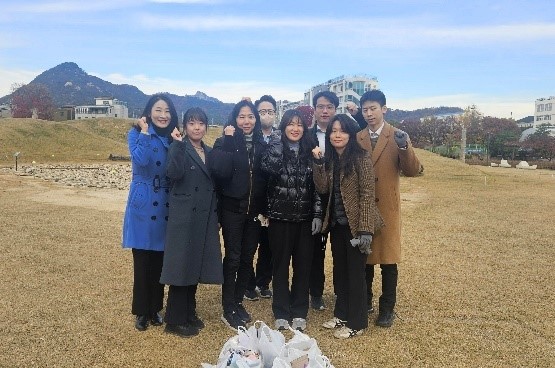 • (November 11, 2024) Head Office Volunteer Group – Eco Plogging
• (November 11, 2024) Head Office Volunteer Group – Eco Plogging

